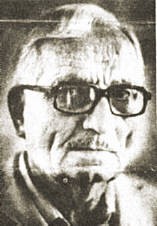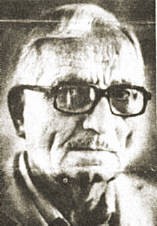===============================
NEWS - Plain Dealer, Wabash (IN) (unknown date)
A major part of Urbana life was the Kratzer Barber Shop. Myrval Kratzer was a son of Myrtle Beghtel and Ed Kratzer. Below is article from the Wabash Plain Dealer written by Earleen Ulery who interviewed Myrval in the 1970's.
BARBER IS TOWN HAIR-STORIAN
URBANA — Myrval Kratzer tenderly rubbed the handmade board seat on his barber chair.
Worn smooth as silk, it means much to the 81-year-old man, who never thought as a youth that he would spend much of his lifetime behind the barber chair.
"The older it gets the better I like it," Kratzer said. The seat, which has saddled Kratzer's barber chair for decades, originally belonged to his father, Ed Kratzer. It was carved from a garden seed box from Independence, Iowa, which the elder Kratzer salvaged from Adam Cook's store next door. Countless kids have sat on it.
"Mark Beghtel is a grandfather now and he used to sit on it as a boy," Kratzer said. Kratzer's Barber Shop, always one of the most popular places in town, drew just about everybody from the community.
"When Urbana was going strong, was I ever busy. Just about everybody came in," he said.
"Mrs. Charles Purdy would bring her whole family and I'd cut their hair one right after the other," he said as he named each child. He rattled of the names of other Urbana families that have had as many as four generations in Kratzer's barber chairs — the Millers, Speichers, Hauperts, Daweses, Shultzes, Brembecks, Chamberlains, Karnses and others.
Kratzer claims the title as the only person living in Urbana who was born there, and time was he knew everyone in the community. But not any more, he says; times have changed.
Searching his keen memory about the town when he started barbering nearly 60 years ago, he sald, "It was a thriving town. There were two banks, four grocery stores, a hardware store, two barbershops, four creameries, a bakery, a shoe cobbler, a blacksmith, a lumber company, a stock yard, an elevator, a drug store, two restaurants and Amber's Hotel where a person could get all they could eat for 25¢.
Six passenger trains a day ran through the town. "Going to see the people get off the train was the only excitement for the kids," he said.
Kratzer got his feet wet in the barbering trade as a high school boy when he worked for Virgil Britton and later for Lawrence Giver. That shop was across the street from the present one. In those days, the barbershop's cistern water was heated in copper boilers on a coal oil heater, and people warmed themselves by a pot bellied stove. Kratzer learned the haircutting trade by doing.
After high school, Kratzer was a soldier in World War I and worked in the office of the Ball Band Rubber Co. in South Bend, where he met his wife, Maxine Snyder. He borrowed $300 from the Urbana Bank and bought the shop where he started in 1921.
His father, Edward W. Kratzer, a jeweler and merchant, had his store across the street. Kratzer moved in with him in 1924, when he promised he would help with the barbering.
The time of men getting shampoos, massages and mud packs are history now. "Men got out of the habit and shampoos and tonics went the way of shaves. There's nothing left but hair cuts, and that suits me," he said.
In his early experience, haircuts were 35 cents and shaves were a dime. Haircuts were short and people hadn't heard of hair styling.
The Kratzer barbers burned the midnight oil, especially on Saturdays when men wanted to get shaved late so they'd be freshly trimmed for Sunday.
Kratzer also recalls when bobbed hair for women came in about 50 years ago. "When women first came in, they were so shy, they would bring their dust caps and cover up their hair," he said. Barbering has been a large part of Kratzer's life, but not the only part. He was a substitute mail carrier for 30 years and worked several hours a day in Cyclone Manufacturing Co.'s shipping department for about the same length of time.
And he was probably Wabash County's most prolific prize winner. Working mostly with magazine contests, he won cars, a tractor, washing machine, refrigerator, stove, ponies, a diamond ring, bicycles, watches and more trinkets and treasures. Kratzer still keeps himself busy with the barbershop but he's cut down the hours. He still stays open two nights a week, but takes off two afternoons.
He remembers well, a bit longingly, when the barbershop was as popular a loafing place as the country store cracker barrel.
And in recent years Jesse Devers, Carl and Frank Eiler, Frank Crumley and Herman Gray would come in to chat a while. But they are all gone now.
"I miss them," he said. "The days seem longer. But I've got a good business and I'm thankful I'm still able to do it. I've had good health through the years and good food. I've been well taken care of by Maxine," he said.
===============================
NEWS - Plain Dealer, Wabash (IN) (unknown date)
A major part of Urbana life was the Kratzer Barber Shop. Myrval Kratzer was a son of Myrtle Beghtel and Ed Kratzer. Below is article from the Wabash Plain Dealer written by Earleen Ulery who interviewed Myrval in the 1970's.
BARBER IS TOWN HAIR-STORIAN
URBANA — Myrval Kratzer tenderly rubbed the handmade board seat on his barber chair.
Worn smooth as silk, it means much to the 81-year-old man, who never thought as a youth that he would spend much of his lifetime behind the barber chair.
"The older it gets the better I like it," Kratzer said. The seat, which has saddled Kratzer's barber chair for decades, originally belonged to his father, Ed Kratzer. It was carved from a garden seed box from Independence, Iowa, which the elder Kratzer salvaged from Adam Cook's store next door. Countless kids have sat on it.
"Mark Beghtel is a grandfather now and he used to sit on it as a boy," Kratzer said. Kratzer's Barber Shop, always one of the most popular places in town, drew just about everybody from the community.
"When Urbana was going strong, was I ever busy. Just about everybody came in," he said.
"Mrs. Charles Purdy would bring her whole family and I'd cut their hair one right after the other," he said as he named each child. He rattled of the names of other Urbana families that have had as many as four generations in Kratzer's barber chairs — the Millers, Speichers, Hauperts, Daweses, Shultzes, Brembecks, Chamberlains, Karnses and others.
Kratzer claims the title as the only person living in Urbana who was born there, and time was he knew everyone in the community. But not any more, he says; times have changed.
Searching his keen memory about the town when he started barbering nearly 60 years ago, he sald, "It was a thriving town. There were two banks, four grocery stores, a hardware store, two barbershops, four creameries, a bakery, a shoe cobbler, a blacksmith, a lumber company, a stock yard, an elevator, a drug store, two restaurants and Amber's Hotel where a person could get all they could eat for 25¢.
Six passenger trains a day ran through the town. "Going to see the people get off the train was the only excitement for the kids," he said.
Kratzer got his feet wet in the barbering trade as a high school boy when he worked for Virgil Britton and later for Lawrence Giver. That shop was across the street from the present one. In those days, the barbershop's cistern water was heated in copper boilers on a coal oil heater, and people warmed themselves by a pot bellied stove. Kratzer learned the haircutting trade by doing.
After high school, Kratzer was a soldier in World War I and worked in the office of the Ball Band Rubber Co. in South Bend, where he met his wife, Maxine Snyder. He borrowed $300 from the Urbana Bank and bought the shop where he started in 1921.
His father, Edward W. Kratzer, a jeweler and merchant, had his store across the street. Kratzer moved in with him in 1924, when he promised he would help with the barbering.
The time of men getting shampoos, massages and mud packs are history now. "Men got out of the habit and shampoos and tonics went the way of shaves. There's nothing left but hair cuts, and that suits me," he said.
In his early experience, haircuts were 35 cents and shaves were a dime. Haircuts were short and people hadn't heard of hair styling.
The Kratzer barbers burned the midnight oil, especially on Saturdays when men wanted to get shaved late so they'd be freshly trimmed for Sunday.
Kratzer also recalls when bobbed hair for women came in about 50 years ago. "When women first came in, they were so shy, they would bring their dust caps and cover up their hair," he said. Barbering has been a large part of Kratzer's life, but not the only part. He was a substitute mail carrier for 30 years and worked several hours a day in Cyclone Manufacturing Co.'s shipping department for about the same length of time.
And he was probably Wabash County's most prolific prize winner. Working mostly with magazine contests, he won cars, a tractor, washing machine, refrigerator, stove, ponies, a diamond ring, bicycles, watches and more trinkets and treasures. Kratzer still keeps himself busy with the barbershop but he's cut down the hours. He still stays open two nights a week, but takes off two afternoons.
He remembers well, a bit longingly, when the barbershop was as popular a loafing place as the country store cracker barrel.
And in recent years Jesse Devers, Carl and Frank Eiler, Frank Crumley and Herman Gray would come in to chat a while. But they are all gone now.
"I miss them," he said. "The days seem longer. But I've got a good business and I'm thankful I'm still able to do it. I've had good health through the years and good food. I've been well taken care of by Maxine," he said.
Family Members
Sponsored by Ancestry
Advertisement
Advertisement










